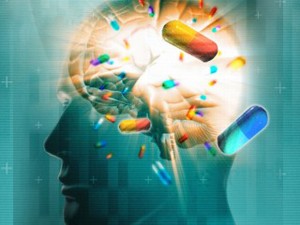Psychiatric Drugs Can Cause Permanent Biological Changes, Dulling Feelings and Hindering Recovery, Researcher Says

Psychotropic drugs can lead to a structural remodeling of the brain that adversely affects emotions and other aspects of mental function and may become irreversible.

Psychotropic drugs act mainly to suppress psychological processes. Suppression is essential to their effect, not a side effect.

With ongoing use of psychotropic drugs, patients become passive and unable to understand and face the causes and consequences of their situation.
Psychotropic drug use can lead to “a structural remodeling of the brain” that dulls emotions and results in withdrawn, “unrecoverable patients.”
Writing in the Journal of Addictive Disorders and Mental Health, Jose Luis Turabian, M.D., Ph.D., reviews the medical literature and refers to his clinical experience to support the view that psychotropic drugs can lead to “a structural remodeling of the brain” that adversely affects emotions and other aspects of mental function and may become irreversible.
“Psychotropic drugs produce functional changes in thoughts, feeling and behaviors that over time [become] structural/organic and permanent,” he writes.
The drugs dull human emotion and cloud cognitive function, making it harder for patients to address the underlying problems leading to the mental symptoms, according to Turabian. “Psychotropic drugs block the expression of feelings, affect the problem-solving process, and make the person passive,” he writes.
He explains that psychotropic drugs act mainly to suppress psychological processes and that “suppression is essential to their effect, not a side effect.”
“Neuroleptics [antipsychotic drugs] suppress motivation and imagination and interfere with regulation of body shape and movement; benzodiazepines suppress behavioral control and discrimination; selective serotonin re-uptake inhibitors [SSRI antidepressants] suppress the erotic [sexual] core,” he says.
The risk of permanent damage to patients increases with the continuing use of the drugs, and he notes that longer-term use has not been well studied. “Overall, there is no good literature on the long-term impact of psychotropic drugs used to treat adult symptoms,” he writes.
What is observable over time with ongoing use of psychotropic drugs are “passive patients, unable to understand and face the causes and consequences of their situation,” he says. “They are unrecoverable patients.”
For this risk of life-long adverse effects, there may be little, if any, benefit to patients from psychiatric drugs. Turabian notes that meta-analyses of clinical trials suggest “psychotropic drugs are only marginally effective compared to placebos,” and only if one ignores “a profound publication bias that increases their apparent efficacy.” Publication bias occurs when unfavorable outcomes of clinical trials are not published.
Other research has also found that the adverse effects of psychiatric drugs on the body can outweigh any potential benefit, as in the case of newer generation, SSRI antidepressants. It is not known how these antidepressants work. What we do know is that the drugs disrupt the body’s normal biochemistry in ways that are not fully understood.
A team of researchers led by Paul W. Andrews, Ph.D., a psychology professor and evolutionary biologist, analyzed previous studies to determine the overall physical impact of SSRI antidepressants on the human body. SSRI antidepressants target serotonin, a neurotransmitter that, in the course of the evolutionary adaptations of the human body, has come to regulate emotion, development, nerve cells, the clotting process, attention, electrolyte balance, and reproduction.
The researchers’ finding, published in Frontiers in Psychology, was clear: “Our review supports the conclusion that antidepressants generally do more harm than good by disrupting a number of adaptive processes regulated by serotonin.”
“It is widely believed that antidepressant medications are both safe and effective; however, this belief was formed in the absence of adequate scientific verification,” they wrote. “The weight of current evidence suggests that, in general, antidepressants are neither safe nor effective; they appear to do more harm than good.”
Psychiatrist Peter Breggin, M.D., describes antidepressants as neurotoxic because they harm and disrupt the functions of the brain, causing abnormal thinking and behaviors that include anxiety, irritability, hostility, aggressiveness, loss of judgment, impulsivity, and mania, which can lead to violence and suicide.
Antidepressants can also take away the joy in life. “In the long run, antidepressants, like almost all psychiatric drugs, lead to apathy, indifference, and lack of caring,” writes Breggin. “Emotional life is dulled and relationships lack empathy and love."
WARNING: Anyone wishing to discontinue or change the dose of a psychiatric drug is cautioned to do so only under the supervision of a physician because of potentially dangerous withdrawal symptoms.
The Citizens Commission on Human Rights continues to make consumers aware of the serious adverse effects of psychiatric drugs so they can make fully informed decisions before starting or quitting the drugs. CCHR also continues to press government mental health and drug agencies to issue further warnings about these risks.
CCHR was co-founded in 1969 by members of the Church of Scientology and the late psychiatrist and humanitarian Thomas Szasz, M.D., recognized by many academics as modern psychiatry’s most authoritative critic, to eradicate abuses and restore human rights and dignity to the field of mental health. Since then, CCHR has helped obtain more than 180 laws that protect mental health patients.
The CCHR National Affairs Office in Washington, DC, has advocated for mental health rights at the state and federal level. The CCHR traveling exhibit, which has toured 441 major cities worldwide and educated over 800,000 people on the history of abusive psychiatric practices up to the present time, has been displayed in Washington, DC, at the Congressional Black Caucus Foundation Annual Legislative Caucus and other locations.
Anne Goedeke
Citizens Commission on Human Rights, National Affairs Office
+1 202-349-9267
email us here
CCHR: Psychiatric Drugs Side Effects
Legal Disclaimer:
EIN Presswire provides this news content "as is" without warranty of any kind. We do not accept any responsibility or liability for the accuracy, content, images, videos, licenses, completeness, legality, or reliability of the information contained in this article. If you have any complaints or copyright issues related to this article, kindly contact the author above.


